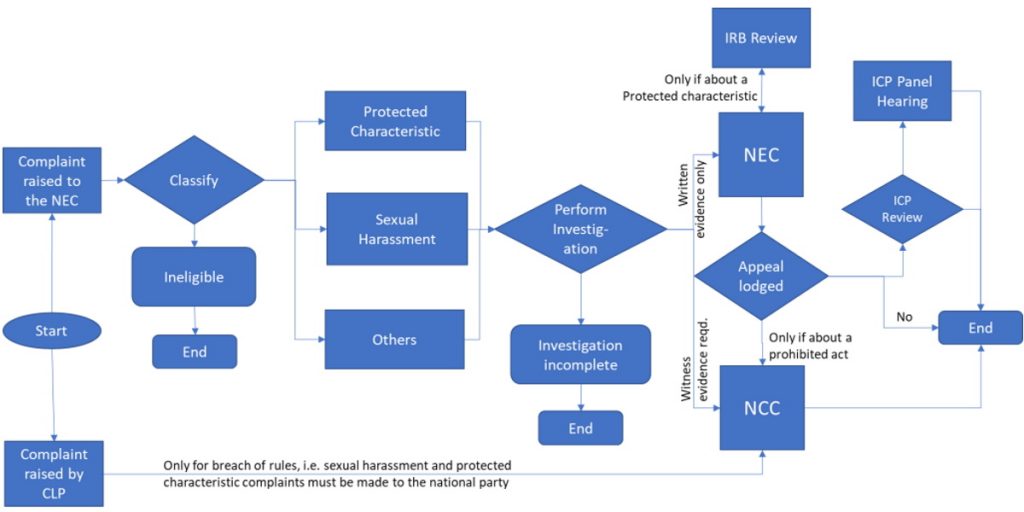I have not read, until today, in detail the new rules on LP complaints. The version published before Conference, well during conference, in the CAC reports were very hard to read. The rules are spread over Chapters 1, 2 and 6 and contain significant numbers of cross references, within the chapters and between the chapters. Here is a flow chart of what I believe to be the process.

The new rules, in Chapter 2, introduced the concept of a prohibited act and codified the prior prohibition of supporting other parties in elections as a proscribed act. There was also an attempt to consolidate a growing body of text dealing with sexual harassment and racist acts. particularly made as an attempt to meet the findings and remediation plan of the EHRC report. I wrote in Dec that I don’t believe these rules meet the criteria of Article 6, the Right to a Fair Trial, of the European Convention on Human Rights (ECHR) and have also noted the Forde Report’s concerns about ECHR compliance.
Complaints made nationally are assessed supposedly by LGU who now need certain levels of training and accreditation to determine if the allegation is about sexual harassment, abuse of a protected characteristic, or another complaint, usually a breach of rules. Complaints can be dismissed at this point for being incomplete or failing to meet the eligibility stated in the Complaints Policy. There seems to be no transparency or appeal against these decisions. The classification is also used to guide the investigation process.
The prohibited acts are in many cases pretty uncontroversial the problem being with,
2.I.5.B.v) Possessing membership of, providing financial assistance to, sitting on the ruling body of or otherwise supporting (as may be defined by the NEC) any political organisation that the NEC in its absolute discretion shall declare to be inimical with the aims and values of the Party.
Labour’s Rule Book C2.I.5.B.v
The problem being with the incomplete definition of ‘otherwise supporting’. Article 7 of the ECHR guarantees no punishment without law. This is to ensure that people can avoid illegal behaviour in the knowledge of the law. This rule cannot be complied with because the offences are unstated and thus unknowable. I also note that member on staff bullying and harassment is a prohibited act but not staff on member, and the complaints process may not be used against staff.
The separation of powers within the LGU taking decisions to prosecute, and initiating the collection of evidence is unclear. i.e. no-one has visibility of the complaint leading to a prohibited act prosecution.
I am really unclear on the role of Independent Review Board, it’s job is to confirm/reject NEC decisions but it seems it only reviews cases about protected characteristics. The rules are unclear on this, although there is some text in Chapter 6 which is about if the NEC cannot make up its mind or it has a conflict of interest C6.I.1.D.iv.
CLP prosecutions are guaranteed a hearing at the NCC. Prohibited act prosecutions that require a witness are guaranteed an NCC hearing. NEC disposals on prohibited act prosecutions are guaranteed an NCC appeal. Chapter 6 complaints handled by the NEC can be appealed to the Independent Complaints Board. These would seem to be the only appeals allowed by Labour’s rules. While an appeal to the ICB can be made on the grounds that no-one reasonable could have come to the conclusion based on the facts, the ICB can refuse to hear an appeal.
IRB is independent review board, ICB is the independent complaints board, ICP is an independent complaints panel a subset of the board convened for a specific hearing, NCC is national constitutional committee, NEC, the national executive committee, and CLP constituency Labour Party. EHRC is the Equalities and Human Rights Commission, ECHR is the European Court of Human Rights.
Minor updates made to the article, including x-ref to Article 7 material.
Important things I didn’t know before I wrote this.
The old 2.I.4.B has been split into proscribed and prohibited acts. Proscribed is supporting other parties in elections (and a vexatious suit against Labour). Prohibited is everything else including, strangely, being a member of a proscribed organisation. There is no appeal nor an entitlement to natural justice for proscribed acts.
Prohibited acts get an appeal to the NCC. A prohibited act complaint requiring witness testimony goes straight to the NCC i.e. avoids an NEC panel sitting and decision. CLP charges go straight to the NCC. I think that any complaint of breach of rules or code or a proscribed act where the defence requires a witness goes straight to NCC. (I am sure that this is not how It was designed.)
Complaints of acts of discrimination are heard by an NEC panel, confirmed (or not) by the Independent Review Board and can be appealed if the Independent Complaints Board agrees to the Independent Complaints Board.
Pingback:Crime and Punishment (in the Labour Party) – davelevy.info